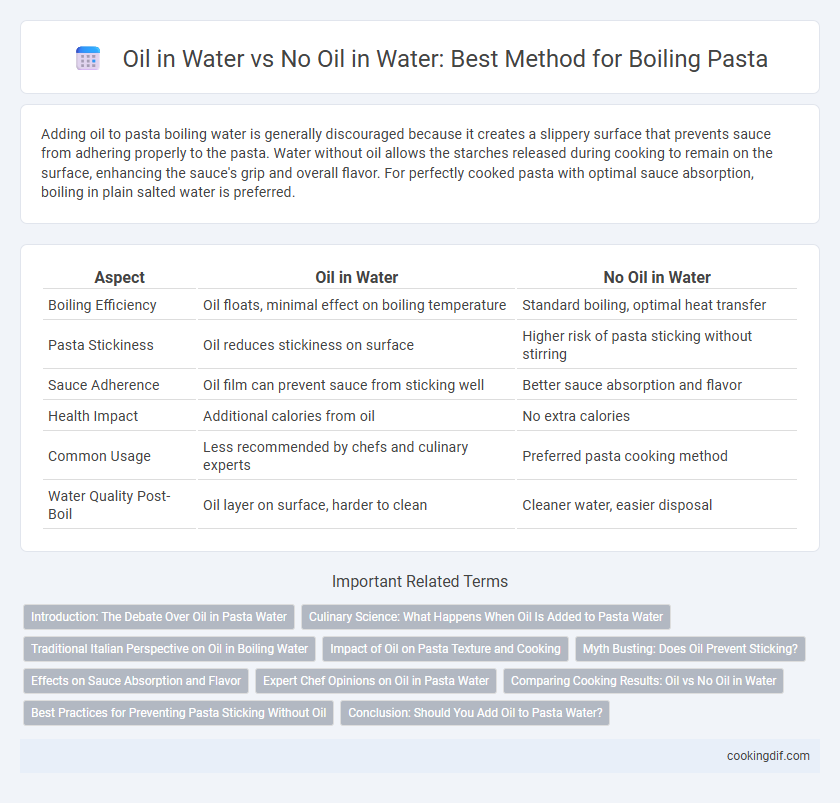Adding oil to pasta boiling water is generally discouraged because it creates a slippery surface that prevents sauce from adhering properly to the pasta. Water without oil allows the starches released during cooking to remain on the surface, enhancing the sauce's grip and overall flavor. For perfectly cooked pasta with optimal sauce absorption, boiling in plain salted water is preferred.
Table of Comparison
| Aspect | Oil in Water | No Oil in Water |
|---|---|---|
| Boiling Efficiency | Oil floats, minimal effect on boiling temperature | Standard boiling, optimal heat transfer |
| Pasta Stickiness | Oil reduces stickiness on surface | Higher risk of pasta sticking without stirring |
| Sauce Adherence | Oil film can prevent sauce from sticking well | Better sauce absorption and flavor |
| Health Impact | Additional calories from oil | No extra calories |
| Common Usage | Less recommended by chefs and culinary experts | Preferred pasta cooking method |
| Water Quality Post-Boil | Oil layer on surface, harder to clean | Cleaner water, easier disposal |
Introduction: The Debate Over Oil in Pasta Water
Adding oil to pasta water is a debated practice among chefs and culinary experts due to its impact on cooking and flavor. Oil can create a film on the water's surface, potentially preventing pasta from sticking but also hindering sauce adhesion. Without oil, pasta releases more starch into boiling water, enhancing sauce absorption and improving overall texture.
Culinary Science: What Happens When Oil Is Added to Pasta Water
Adding oil to pasta water creates a thin hydrophobic layer on the surface that prevents water from boiling over but does not stop pasta from sticking together. The oil floats on top and does not mix with the water, so it fails to coat the pasta directly, limiting its effectiveness in keeping strands separate. Culinary science shows that stirring and using adequate water volume are more crucial methods for preventing pasta from sticking than adding oil to the boiling water.
Traditional Italian Perspective on Oil in Boiling Water
Traditional Italian cooking strictly advises against adding oil to pasta boiling water because it prevents the sauce from adhering properly to the pasta, resulting in a less flavorful dish. Instead, Italians emphasize using plenty of well-salted water to enhance the pasta's natural taste and texture. This technique preserves the authentic al dente quality and ensures the sauce clings perfectly, maintaining the dish's overall integrity.
Impact of Oil on Pasta Texture and Cooking
Adding oil to boiling water when cooking pasta can prevent water from foaming and reduce sticking, but it may create a slippery coating that hinders sauce adhesion, impacting texture negatively. Without oil, pasta absorbs water more effectively, resulting in a firmer, al dente texture and better sauce integration. For optimal cooking, rely on proper stirring and ample water volume instead of oil to maintain desired pasta consistency and texture.
Myth Busting: Does Oil Prevent Sticking?
Adding oil to pasta water is a common myth believed to prevent sticking, but in reality, oil floats on the surface and does not mix with water, failing to coat the pasta effectively. The best method to prevent pasta from sticking is to use plenty of boiling water and stir the pasta frequently during the first few minutes of cooking. Properly salted water enhances flavor, while avoiding oil ensures the sauce adheres better to the pasta after draining.
Effects on Sauce Absorption and Flavor
Adding oil to pasta boiling water creates a thin film that prevents sauce from adhering properly, reducing flavor absorption and resulting in a less cohesive dish. Pasta cooked without oil retains a slightly rougher surface, enhancing sauce clinging and intensifying taste integration. Optimal pasta texture and sauce flavor depend on avoiding oil in boiling water to maximize sauce absorption and overall palate enjoyment.
Expert Chef Opinions on Oil in Pasta Water
Expert chefs widely agree that adding oil to pasta boiling water is unnecessary and can hinder sauce adherence by creating a slippery pasta surface. High-end culinary sources emphasize that vigorous boiling, proper salt levels, and stirring are more effective for preventing sticking than oil additions. Many professional chefs recommend reserving flavored oils for finishing the dish rather than altering boiling water composition for optimal pasta texture and sauce compatibility.
Comparing Cooking Results: Oil vs No Oil in Water
Adding oil to boiling water when cooking pasta prevents water from foaming and boiling over but does not significantly affect the pasta's cooking time or texture. Pasta cooked without oil tends to absorb sauces better due to the absence of an oily coating on the surface, which can cause sauce to slide off. Therefore, omitting oil in the boiling water is generally preferred for optimal sauce adhesion and flavor enhancement.
Best Practices for Preventing Pasta Sticking Without Oil
Adding oil to boiling water when cooking pasta is often believed to prevent sticking, but it can create a greasy surface that hinders sauce adhesion. Best practices for preventing pasta from sticking include using a large pot with ample water, stirring pasta thoroughly during the first few minutes of cooking, and ensuring the water remains at a rolling boil. These methods optimize texture and flavor without compromising sauce absorption, making oil unnecessary in the boiling water.
Conclusion: Should You Add Oil to Pasta Water?
Adding oil to pasta water is unnecessary and can hinder sauce adhesion by creating a slippery surface on the noodles. Boiling pasta in salted water without oil ensures proper cooking and better flavor absorption. To prevent sticking, stir pasta occasionally during the first few minutes of cooking rather than adding oil.
Oil in water vs no oil in water for pasta boiling Infographic

 cookingdif.com
cookingdif.com